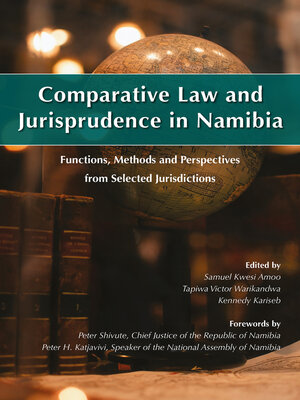Comparative Law and Jurisprudence in Namibia
ebook ∣ Functions, Methods and Perspectives from Selected Jurisdictions
By Samuel Kwesi Amoo

Sign up to save your library
With an OverDrive account, you can save your favorite libraries for at-a-glance information about availability. Find out more about OverDrive accounts.
Find this title in Libby, the library reading app by OverDrive.



Search for a digital library with this title
Title found at these libraries:
| Library Name | Distance |
|---|---|
| Loading... |
Comparative law examines the differences and similarities between various countries' laws and legal systems across the world, such as common, civil and socialist laws. Its significance has grown dramatically in the current era of internationalism, populism, (economic) globalization, and democratization. Despite its relevance, Namibia lacks scholarly literature in comparative law. Comparative Law and Jurisprudence in Namibia provides in-depth understanding of the theoretical framework of different legal systems and of comparative law, and contextualizes its application for the Namibian context, particularly towards a unified legal system. It addresses topics such as comparative law's conceptual framework, the interplay between courts and comparative law, and comparative law praxis, or the practical application thereof. The chapters span across all levels of comparativism and promote a multidisciplinary approach to discourse including altering Namibian legal education. Futhermore the collection accelerates required legislative change in Namibia to guarantee a legal structure aligned with societal and constitutional imperatives in the twenty-first century.|Comparative law examines the differences and similarities between various countries' laws and legal systems across the world, such as common, civil and socialist laws. Its significance has grown dramatically in the current era of internationalism, populism, (economic) globalization, and democratization. Despite its relevance, Namibia lacks scholarly literature in comparative law. Comparative Law and Jurisprudence in Namibia provides in-depth understanding of the theoretical framework of different legal systems and of comparative law, and contextualizes its application for the Namibian context, particularly towards a unified legal system. It addresses topics such as comparative law's conceptual framework, the interplay between courts and comparative law, and comparative law praxis, or the practical application thereof. The chapters span across all levels of comparativism and promote a multidisciplinary approach to discourse including altering Namibian legal education. Futhermore the collection accelerates required legislative change in Namibia to guarantee a legal structure aligned with societal and constitutional imperatives in the twenty-first century.







